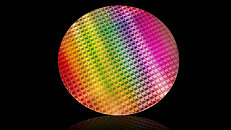- Joined
- Oct 9, 2007
- Messages
- 47,508 (7.49/day)
- Location
- Hyderabad, India
| System Name | RBMK-1000 |
|---|---|
| Processor | AMD Ryzen 7 5700G |
| Motherboard | ASUS ROG Strix B450-E Gaming |
| Cooling | DeepCool Gammax L240 V2 |
| Memory | 2x 8GB G.Skill Sniper X |
| Video Card(s) | Palit GeForce RTX 2080 SUPER GameRock |
| Storage | Western Digital Black NVMe 512GB |
| Display(s) | BenQ 1440p 60 Hz 27-inch |
| Case | Corsair Carbide 100R |
| Audio Device(s) | ASUS SupremeFX S1220A |
| Power Supply | Cooler Master MWE Gold 650W |
| Mouse | ASUS ROG Strix Impact |
| Keyboard | Gamdias Hermes E2 |
| Software | Windows 11 Pro |
The United States government is close to finalizing a plan rivaling China's for semiconductor manufacturing self-sufficiency. It calls for U.S. semiconductor companies, such as Intel, to manufacture high-technology products "securely" at facilities on U.S. soil, so that the U.S. market is unaffected by disruptions to multi-national supply chains brought about by global-scale events (such as the COVID-19 crisis).
Some, such as The Verge's T.C. Sottek point this out to be a de-globalization strategy. Excerpts of one such communication between Intel CEO Bob Swan and the U.S. Department of Defense, dated April 28, was posted by WSJ, where he is quoted saying that exploring a commercial chip foundry on U.S. soil was "it is in the best interest of the United States and of Intel." The last major chipmaker that attempted U.S.-made chips was AMD, by tapping into GlobalFoundries' Upstate NY-based 14 nm-class FinFET nodes to make its 1st and 2nd gen Ryzen processors. AMD had to seek out TSMC as GloFo gave up its 7 nm-class transition plans, forcing AMD to modify its wafer supply agreement. The company now only manufactures older-gen "Picasso," "Polaris 30," and I/O dies for the latest Ryzen and EPYC processors there.

View at TechPowerUp Main Site
Some, such as The Verge's T.C. Sottek point this out to be a de-globalization strategy. Excerpts of one such communication between Intel CEO Bob Swan and the U.S. Department of Defense, dated April 28, was posted by WSJ, where he is quoted saying that exploring a commercial chip foundry on U.S. soil was "it is in the best interest of the United States and of Intel." The last major chipmaker that attempted U.S.-made chips was AMD, by tapping into GlobalFoundries' Upstate NY-based 14 nm-class FinFET nodes to make its 1st and 2nd gen Ryzen processors. AMD had to seek out TSMC as GloFo gave up its 7 nm-class transition plans, forcing AMD to modify its wafer supply agreement. The company now only manufactures older-gen "Picasso," "Polaris 30," and I/O dies for the latest Ryzen and EPYC processors there.

View at TechPowerUp Main Site




